8 Types of Countertop Materials to Consider for Your Kitchen
Author: Rick Worst | Editor: Omar Alonso
Review & Research: Jen Worst & Chris Miller
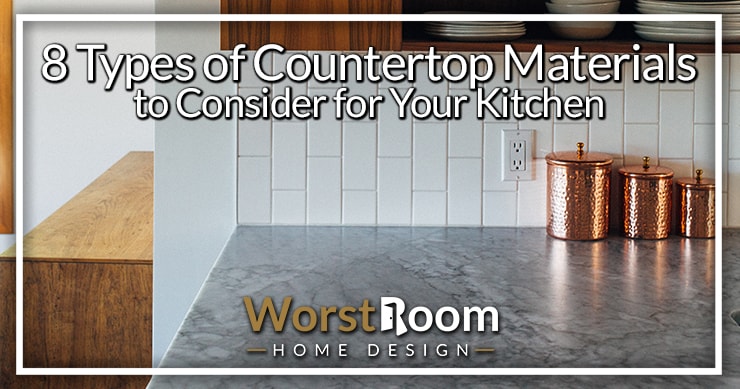
The kitchen is a special place in most people’s homes since it’s where we cook for our family and spend quite a bit of time every day. When dealing with kitchen design, there’s one thing that may cause you a headache - the different types of countertop materials.
Don’t worry - we’ll get straight to the point in this guide by giving you a brief overview of things to look for when choosing or combining countertop materials. There are several vital points here - how it fits into the kitchen decor, the quality, and durability of the material, as well as how easy it is to work with.
Key Factors to Consider With Countertop Materials
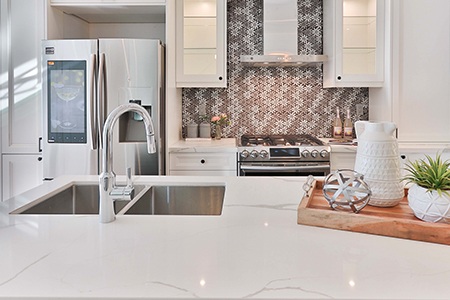
The obvious thing to consider with countertop material selection is, well, the material itself (and how it matches your kitchen style). This depends on the application and your preference, but let’s leave that for later while we discuss other key points, so the material may showcase itself to you naturally by the time we are done:
- Material quality & durability
- Usability
- Up-keeping
- Countertop purpose
It goes without saying that you’ll want to work with materials that blend right into your kitchen decor. However, you can experiment a bit with that one, since even a stainless steel countertop can fit into a fully wooden design style of a kitchen space if done correctly.
Countertop Durability
The most important thing is to properly allocate your budget for a kitchen countertop since some materials like marble can be quite expensive. Still, it’s more important to pick a high-quality and long-lasting option, so you won’t have additional expenses over the years or eventually need to replace your entire countertop.
We suggest you take a look at how the material reacts to knife scratches, food stains, and heat since these are all factors to which a kitchen countertop will be exposed to. Because of this, granite or quartz options are among the most durable ones, but they need sturdy support and are heavy.
Practicality & Usability
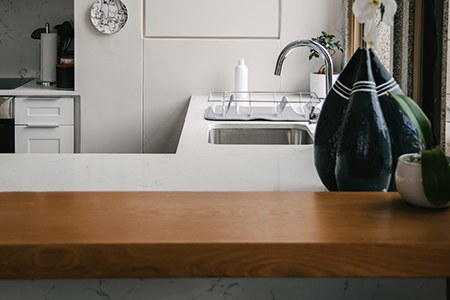
The right types of countertop materials greatly depend on what you’ll be using it for, and that’s where the usability factor kicks in. To give you one example, you may be thinking about installing a reverse osmosis faucet in case you wish to always have a reliable source of clean and fresh water.
In this case, a lot can depend on the countertop material you’ve chosen since you may need to drill a new hole for that faucet. Naturally, it’s much easier to do this if you have a wooden countertop when compared to firm options like marble or granite.
There are even tools you can use to cut through stainless steel countertop parts, but this is best done by a professional.
The other example is if you wish to use the entire countertop surface for cutting meat and cooking. Wood is not the best option here for sure. For such purposes, you can get a stainless steel or quartz surface to prevent damage from knife cuts or heat.
Maintenance
Another significant factor is upkeep and it’s much easier to maintain a quartz or stainless steel countertop when compared with granite or marble options which may need to be sealed to remain preserved.
Ceramic counter tops can also be quite difficult to preserve due to them being prone to scratches, so you may end up wasting more time worrying about the countertop than cooking.
Countertop Purpose
Finally, we reach the one last factor you should consider and that’s what the countertop will be used for on a day to day basis. Let’s face it - some families do less cooking and if you are purely looking at it from a style perspective, you could get a marble countertop to complement your kitchen’s design.
Marble will increase the value of the entire household. Quartz or granite options are quite similar. Some people simply prefer doing their chopping and cooking on a special kitchen surface!
But if you will be doing a lot of work on the countertop, it’s best to use an option that won’t be difficult to upkeep, has solid resilience to heat and scratches, and fits into diverse design options. So, in this case, wooden or laminate options may be the best ones along with steel.
Types of Countertop Materials
Of course, all of this discussion doesn’t matter if we don’t look at the material options for countertops available to you. Let’s summarize the main points for each.
Granite
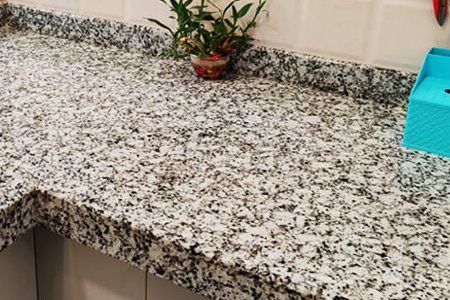
Granite countertops come in a vast variety of colors with endless visual patterns on the surface. They’re resistant to heat, don’t scratch easily, and each slab will be unique. This strength and durability comes at a high price with a semi-regular maintenance routine to seal the surface. Some people even ruin the beautiful appearance of their granite countertops by painting them to seal them! Even so, there's a good reason granite is used in the kitchen.
Marble
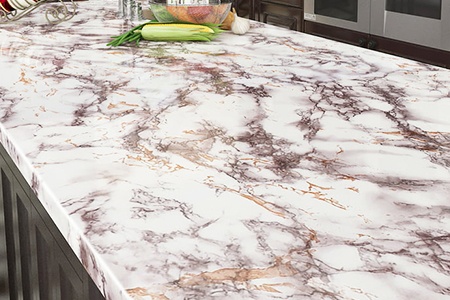
Marble of any type is considered a luxury countertop surface that comes with both a hefty price and a hefty weight. It resists scratches, breaks, and heat, making it a very long-lasting option. Each slab will be unique as marble has unpredictable veins that run through it.
There are countless types of marble colors and patterns to choose from, and you can even drive the price down by choosing faux marble. The problem is marble can scratch and stain if it’s not sealed regularly, so it’s not for the lazy.
Soapstone
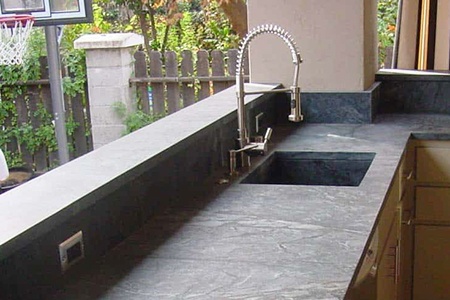
Soapstone is a non-porous countertop material, meaning it won’t collect stains. It can resist heat, bacteria, and has a soft feel to it due to the high amount of talc in it. You need to treat it with mineral oil regularly and it can receive scratches and indentations if not treated carefully.
Acrylic & Resin or Laminate
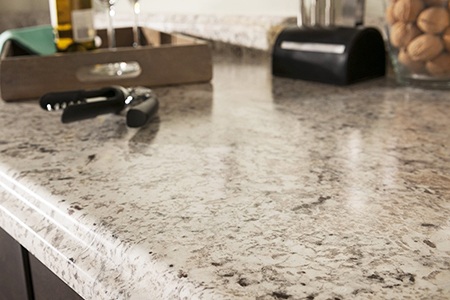
The solid-surfaced engineered surfaces you see in apartments are often times acrylic and resin, but sometimes a cheaper laminate surface over a shaped particle board. These are fairly cost effective, very resistant to staining, and come in tons of options. These are probably the most common types of countertop materials out there, just based on price and ease of replacement.
If you don’t like to see seams, this is the best way to minimize their visibility as there won’t be visual patterns to match up since they’re a solid color. They can be scratched over time. Laminate can swell if water gets under the sealed surface into the wood.
Quartz
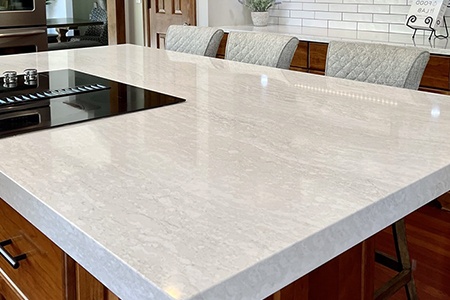
Quartz is what you want if you want natural stone but don’t want to spend the money on marble or granite. Again, you get endless design choices with this non-porous material that resists mold, stains, and mildew without the need for repetitive sealing. The main issue is sunlight can cause fading, they can be scratched, and if you place a hot pan on them they can receive heat damage.
Tile
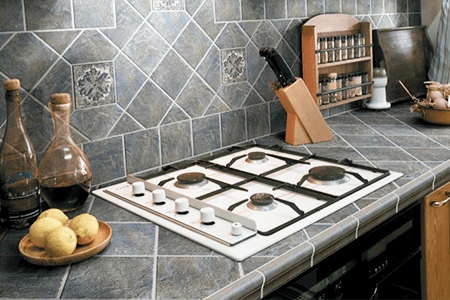
Some people opt for ceramic tile, like seen in a bathroom or on a kitchen backsplash as their countertop surface. I feel this is a bad idea due to the ease of cracking, the staining and discoloration in the grout, and the non-flat surface.
Tile cracks easily because it’s so brittle. Avoid this if you actually cook and use your countertops as more than decoration. If you do want to go this route there are plenty of types of tile to choose from.
Butcher Block Wood
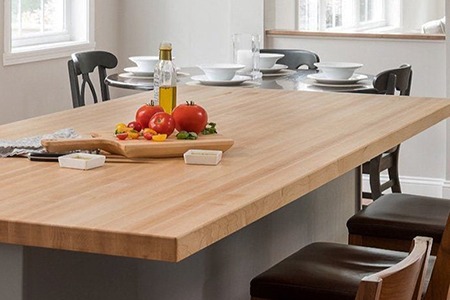
Known for their use in custom cutting boards, butcher block wood is very strong and can last for years, but the end-grain of the wood facing upwards means that it can and will become scratched and stained over time. It should be sealed every couple of years to resist this, and oiled regularly.
Stainless Steel
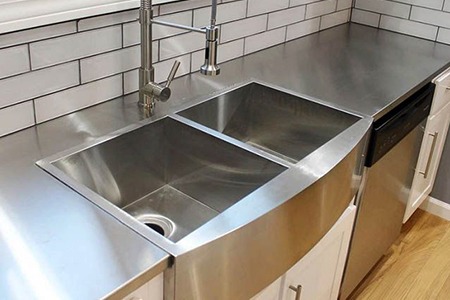
The most modern option is stainless steel. These countertops are easy to clean, completely resists mildew and mold and especially staining. It can be difficult to keep pristine and free and smudges and smearing, though. It won’t take on heat damage and can be cleaned easily of spills and food. The downsides are that it’s expensive and very easily scratched.
The Types of Countertop Materials to Choose From
It would seem the main considerations to choose from are durability, resistance to mold, heat, and scratching, and budget. You should be able to achieve your aesthetic with any of the different types of countertop materials without breaking the bank. Just don't go too cheap or stretch your budget too far. Both directions will lead to regret. Happy home designing!



